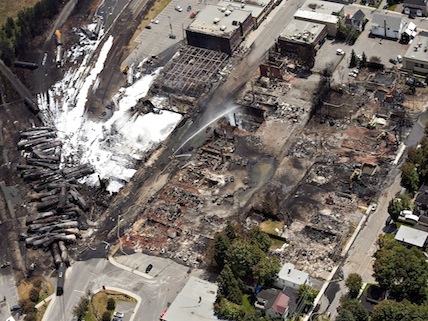Wreckage of the runaway train that derailed in downtown Lac-Mégantic, Quebec, igniting tanker cars carrying crude oil
A runaway train laden with oil derailed in the small town of Lac-Mégantic in Quebec on July 6, spilling crude oil and causing explosions that killed as many as fifty people. In Canada’s deadliest train accident in over a century, at least thirty buildings were destroyed and fires burned for days. Canada’s prime minister, Stephen Harper, said the disaster site, not far from the Canada-Maine border, looked like “a war zone.” While the loss of life and damage to the town are the immediate concerns, the calamity also raises questions about the economics of oil transportation.
The circumstances that led to the crash of Montreal, Maine & Atlantic Railway train are under investigation—an onboard fire just hours before may have damaged its brakes, and criminal neglect has not been ruled out. Somehow the “fail-safe” brakes failed and the unattended train rolled downhill for six miles before impacting Lac-Mégantic. The oil being transported was en route from the oil-shale fields of North Dakota to a refinery on the New Brunswick coast, destined ultimately for the U.S. market. Already there is vigorous speculation about the effect of the crash on railroad-safety regulations, in both Canada and the United States. Railroad-safety advocates are calling for a ban on one-man “crews” (which are less common in the United States than in Canada) and the outlawing of DT-111 cargo tankers, which have been repeatedly cited as vulnerable upon derailment.
Beyond railroad safety and regulation, the larger issue of oil transport is being hotly debated. Supporters of the proposed XL Pipeline—which, if completed, could carry oil from northern Alberta to the Texas Gulf Coast—point to pipelines’ better safety record. In part because the controversial pipeline project has been delayed for months, more oil is being transported by rail than ever before. The chief argument of environmentalists against pipelines focuses on the risk of spillage, especially in wilderness areas or near water wells.
Image credit: © AP Photo/THE CANADIAN PRESS, Ryan Remiorz
Related Links
- Canada Rail Crash Stirs Debate over Keystone XL Pipeline Delay
This article examines the renewed pipeline-versus-rail debate over the safest way to transport oil.
(Source: Los Angeles Times, July 12, 2013) - Canadian Tanker Train Crash Raises Fresh Questions on Oil Transportation
This article explores the implications of the train wreck for the Keystone XL Pipeline and railroad-safety regulatory reform.
(Source: Guardian, July 16, 2013) - Quebec Rail Disaster Seen Jump-Starting Safe Push
This article discusses the impact on capital, labor, and operating costs in the oil transportation industry that would result from new safety regulations in the wake of the Quebec train accident.
(Source: Bloomberg.com, July 17, 2013) - Lac-Mégantic Derailment
It is articles like this that make Wikipedia indispensable.
(Source: Wikipedia; accessed August 5, 2013) - Lac-Megantic Train Crash: How It Will Change Canadian Oil
This article discusses the Quebec train disaster in the context of the booming oil industry in Canada.
(Source: Christian Science Monitor, July 12, 2013)




